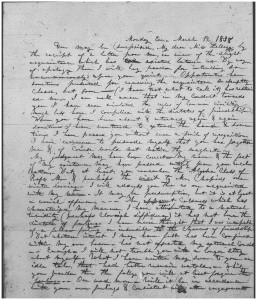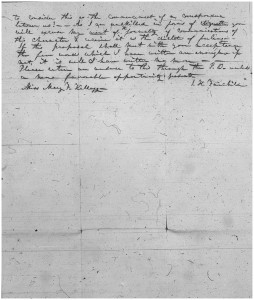Document 1:
Author: James Harris Fairchild
Recipient: Mary Fletcher Kellogg
Date: 19 March 1838
Location: Oberlin College Archives, James H. Fairchild Papers. Series III Courtship Correspondence,
1771-1926, RG 2/003.
Document Type: Transcript (1939) Autograph Letter, Signed by Author.
Introduction:
The following document is the first letter James Fairchild sent to Mary Kellogg. It was expected that James, as a man, would take the initiative in such a correspondence, which he did. However, it is worth noting the fact that though James and Mary were currently studying together at Oberlin, he had not sought her out in person, but instead began a correspondence. Furthermore, unlike other courtship correspondences of the day, James’ did not make his romantic intentions clear from the beginning, though they were implied.1 It is also worth noting that the letter reveals the level of James’ and Mary’s acquaintance before they began this courtship.
Transcription:

Monday Evening, March 19, 1838.
You may be surprised my dear Miss Kellogg, by the receipt of a letter from me, in view of the slight acquaintance which has existed between us. By the way of apology then, I will beg pardon for intruding so unceremoniously upon your quiet. Opportunities have sometimes presented for renewing the acquaintance so abruptly closed but some–I know not what to call it–has restrained me. I am well aware that in my conduct towards you, I have even violated the rules of common civility. Much less have I complied with the dictates of friendship. When you have been absent and have returned again and again,2 sometimes I have ventured to extend the hand and sometimes I have passed you without even a smile of recognition. I have endeavored to persuade myself that you had forgotten me and, of course, would not notice the neglect. My judgment may have been correct–my name and the fact of my existence may have passed entirely from your recollection. But, at least, you remember the Algebra class of Professor Morgan,3 and perhaps the visit to Mrs. Crosby’s4 one evening. I will address you then as one acquainted with my name. It may be presumption, but it is at least a venial offense. The apparent coldness which has characterized my manner, I have attributed to a natural timidity (perhaps clownish diffidence); it has not been the dictate of feeling. I have never thought that I was incapable of a fellow feeling or insensible to the charms of friendship. But whatever interest I may have felt has been confined within my own bosom, has not affected my external conduct.
Enough, I will not trouble you with a longer story about myself. What I have written may seem to you an idle tale that had better remain untold. While you pardon then the folly, you will at least forgive the feeling.

One word more–will it be in accordance with your own feeling and consistent with other engagements to consider this as the commencement of a correspondence between us? As I am unskilled in forms of etiquette, you will excuse my want of the formality of communications of this character and receive it as the dictate of feeling.
If this proposal shall meet with your acceptance, the few words which I have written are enough–if not, it is well I have written no more–
Please return an answer to this through the P.O. unless a more favorable opportunity presents.
J. H. FAIRCHILD
To Miss Mary F. Kellogg
Transcribed by Rebecca Debus.
1 See Part One of the collection “Wives, Sisters and Daughters: Henry Woodcock’s correspondence with the women in his life” for a look at the beginnings of another courtship correspondence.
2 For some of the time while she was at Oberlin, Mary was studying at its satellite campus in the nearby town of Sheffield. It is unclear when precisely she was there, but that may be what James referred to when he spoke of her comings and goings.
3Professor John Morgan (d. 1884) was one of the Lane Rebels, the students and professors from Lane Seminary who left the school after their abolitionist activities were curtailed and then collectively transferred to the newly founded Oberlin College. He was generally a Professor of Theology, but he filled a vacancy in the math department for several years (General Catalogue of Oberlin College 1833-1908. Cleveland, Ohio: The O. S. Hubbell Printing CO., 1909).
4 Mrs. Crosby lived in a log cabin on the edge of town. Early visitors remember climbing over fallen tree-trunks on the way to her house. Even then, she had her garden, chrysanthemums in the fall and tulips in the spring. The story is that one year she counted fifteen hundred tulips in bloom. Certainly, for many years, the students enjoyed visiting Salina Crosby’s garden.